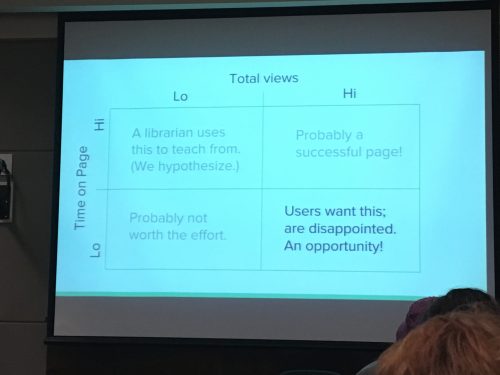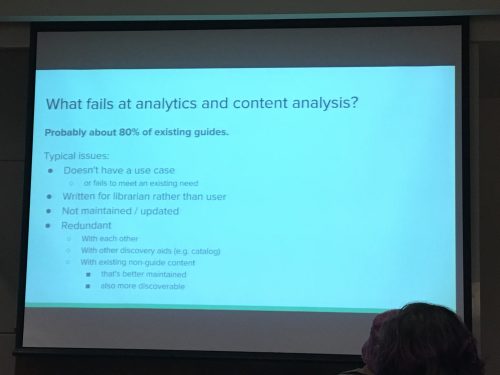This article is more than 5 years old.
On Monday, March 13th, Carolyn, Meghan and Steve drove to Chapel Hill to attend the one-day LAUNC-CH Conference. Steve was able to borrow the good car from Mimi, so they rode in relative comfort. The theme of the 2017 conference was “Human Centered Libraries: Crafting Value and Relevance,” and most of the presentations hewed pretty well to this idea. What follows are collective reflections and recaps of select 2017 LAUNC-CH Conference Sessions and offerings:
Keynote Address: “Relevance, Connection, Expressing Values: The Atkins Ethnography Project”, Donna Lanclos, UNC-Charlotte
Lanclos is a professor of anthropology who is based in and works for the Atkins Library at UNC-C. She uses ethnographic techniques to study the behavior of students and other library users to figure out how to improve library services. Lanclos studies the logic of how people do things and takes a holistic approach to their behavior. She conducts qualitative research, not quantitative research, and is focused on developing stories about student behavior. Because her work is about figuring out the logic of how people do things, it often does not boil down to problems that need to be solved. One example of her work that she shared was a project to study how students used space on the first floor of the library. She found that the furniture was stiff, uncomfortable, and rigidly structured. It could not be moved around, and was very awkward for group study or collaboration. As an experiment, in one small part of the first floor, Lanclos and her team put in soft furniture (sofas, arm chairs), low tables and a white board. The space was not announced or programmed in any way by the library, but students instantly knew how to use it. It became a sought-after group study space in the library. The success of this project was used to justify the purchase of new furniture throughout the library’s first floor.
Sometimes citing other examples, Lanclos discussed how libraries need to acknowledge that students are more than just students. They have more complex lives with more interests and needs than simply those of being students. Through her work, she found that the reasons students don’t study in the library have more to do with the complexity of their lives than with anything to do with the library. For example, for students with young children, the lack of facilities to occupy their children may hinder their use of the library. To that end, the Atkins Library created a “Family Friendly Study Room,” which provide a space where parents can study *and* their kids can play or quietly occupy themselves. Lanclos emphasized that library ethnography involves seeing students as people, which is not something that can be quantified.
Carolyn and Steve’s Presentation (with Kevin in absentia): “Can RDA Content, Media, and Carrier Coding Improve Discovery Format Mapping?”
Carolyn and Steve presented during one of the break out sessions. Kevin was supposed to present with us, but he was brought low by a nasty fever virus that he caught from his kids. But the show must go on, so Carolyn and Steve (mostly Carolyn) filled in on Kevin’s parts. The presentation was a live version of an article of the same name that the three of them co-wrote with Lauren that is due to be published in the April issue of the ALCTS journal “Library Resources and Technical Services,” or LRTS (which is possibly the ugliest initialism in all of the library world. When pronounced, it sounds like an old-timey name for some medical ailment. “Great-grandpa Elmer came down with a bad case of the lurtz in ought-six.” Maybe Kevin caught lurtz from his kids). The presentation (and article) examined if the addition of RDA coding to ZSR’s bib records could be used to improve how VuFind does faceting searching. Although the presentation was focused on technical issues, it wound up fitting nicely with the conference theme of human centered libraries, because the major finding of the project was that we could not simply rely on the addition of this new coding to meet our human users research needs when using the catalog. The new RDA coding only describes the physical characteristics of bibliographic resources, and therefore, only these physical characteristics would be used in assigning format facets in VuFind. But our users think of format as more than just a collection of physical characteristics, they also consider the content. For example, we have a separate format facet for government documents, which really refers to who publishes the material, not the physical characteristics of the material. If you’d like to find out more about all this, you can either read the article when it comes out in April, or talk to Carolyn, Kevin, Steve or Lauren about it.
“I Need Space! Responding to Students’ Requests for Diverse Spaces and Furniture”, Emily Daly, Duke University
Duke University’s Head of Assessment & User Experience for the Perkins Library, Emily Daly, opened her presentation with the statement, “Space is a service and shouldn’t be thought of as an afterthought.” In 2016, undergraduate and graduate students were surveyed as to what expanded services they would like to see the library spend money on. The top 4 responses related to quiet and group spaces. The library now has a prayer and meditation room to meet the spiritual needs of students. The library has purchased and made available for checkout whiteboard marker kits and meditation cushions, and during exams, earbuds are purchased for student use as well. The library rejected the idea of furnishing nap pods, but as a compromise, library staff is working with student government and the Student Health Advisory Committee to design a mindfulness room. The library plans to conduct a user satisfaction survey in 2018.
“Let Your Conscience By Your Guide: Taming Online Research Guides at the NCSU Libraries”, Lillian Rigling & Andreas Orphanides, NC State
Meghan was particularly interested in this session, as she plans to lead a refresh of ZSR LibGuides in the near future. Lillian and Andreas presented an overview of their initial assessment and review of online library guides used at NC State Libraries. In advance of a large-scale refresh and comprehensive plan for continuous review of online guides, their findings provide valuable information about how their library guides are used and offer insight towards best practices for guide creation.
First, they conducted an analysis of the complete inventory (~45) of existing online guides. Generally, the guides are varied in scope, following a topical distribution, with mostly STEM-focused content (~30 course specific guides) and other library-related content (citations, ETDs, etc.). Using Google analytics stats, they could match guides with user-experience data, and they developed an assessment matrix to help identify which guides were successful at meeting the needs of their users (and determine which content areas exist as an opportunity to enhance guide content).

After conducting a thorough content analysis of “high-use” and “low-use” guides, they were able to recognize common features of successful guides, which they will use to enhance existing guides and inform the creation of new online guides. Overall, they recognized that guides that appeared more “useful” tended to address concrete, realistic use cases and utilized clear, need-driven directives. Some general takeaways from their analysis:

“Refocus on the User”– Figure out a use case for your patrons:
- Who are your targeted users?
- What do your users need?
- How do you know they have that need?
- How will your content solve that need?
- How will your users discover your content?
“Content is King”– Focus on populating online guides with meaningful content:
- Dive right into content
- Don’t duplicate library catalog search results
- Link out to other web content instead of redescribing other library services
- Try alternative ways of representing content (i.e. tables)
- When in doubt, leave it out!



4 Comments on ‘Carolyn, Meghan, and Steve at LAUNC-CH’
The LAUNC-CH Conference is always impressive! Fascinating space information from Duke, and a timely presentation on LibGuides as we approach Summer and the chance to reflect and reorganize guides! Congrats on what sounds like an excellent presentation!
Nice collaborative wrap-up, y’all! Interesting session on LibGuides; I think there are some lessons in there for archival collection finding aids, too.
Glad the presentation went well and thanks for sharing this info!
The experience at UNC-C mirrored our own findings with the “Assessment in Action” program we did recently. We found that first years used the library heavily as a study spot, while sophomores and juniors did not. As we discussed this information in focus groups we found that it wasn’t because they didn’t “love us less”. It was because their residence halls were on the other side of campus, and they didn’t have time to get from there to here to study anymore. As seniors, they came back to ZSR because studying in the library was closer than going home, off campus!